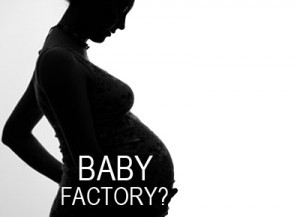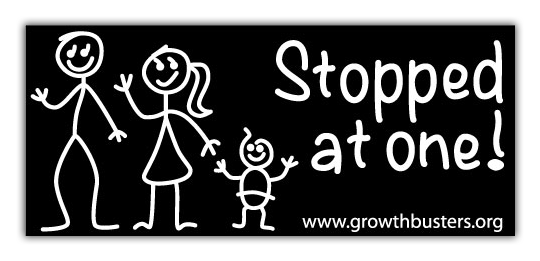One-Child Thinking
 This week Huffington Post published a blog by Julie Cole titled 6 Reasons to Have 6 Kids. Im not sure how much attention anyone is paying over there to what their bloggers are doing, but Cole’s piece cannot be defined as “progressive.” Progressive thinking about family size will take into account several factors that go unmentioned in her blog. They are clearly unconsidered by any couple that has conceived 6 children in the modern world. More about that below.
This week Huffington Post published a blog by Julie Cole titled 6 Reasons to Have 6 Kids. Im not sure how much attention anyone is paying over there to what their bloggers are doing, but Cole’s piece cannot be defined as “progressive.” Progressive thinking about family size will take into account several factors that go unmentioned in her blog. They are clearly unconsidered by any couple that has conceived 6 children in the modern world. More about that below.
Meanwhile, at xoJane.com, Sarah Brown recently penned a bit of a screed about the way she is treated as a woman who’s chosen to be childfree. How Not to be a Dick to Your Childhood Friends appropriately calls out what I’ll call Victorian attitudes many still have about the role of women in the world as baby-factories. It fails, however, to point out one of the wisest reasons for choosing not to conceive children.
I thought I’d write about these two commentaries because they both miss the most – or at least one of the most – critical factors that should drive decisions about family size:
 What size family gives the most assurance all the children of the world (including mine) will be able to live good, fulfilling lives in a beautiful world – without hunger, without poverty, and without living in a bleak, toxic, industrial wasteland?
What size family gives the most assurance all the children of the world (including mine) will be able to live good, fulfilling lives in a beautiful world – without hunger, without poverty, and without living in a bleak, toxic, industrial wasteland?
Both writers appear to be ignorant of the fact that the ecological footprint of each additional human being added to the population matters. It matters a lot today, precisely because we didn’t bother to consider it over the past 200 years as we’ve sextupled the world’s population.
The best data we have indicates the impact of humanity on our life-supporting ecosystems crossed out of the sustainable zone about 40 years ago. That means the combination of how many of us there are and how we’re behaving began injuring those systems and has been whittling away at their capacity ever since. Every year that we exceed the world’s “carrying capacity,” we further weaken those systems.
If a man jumps off the top of a 100-story building, and you poke your head out the window of the 15th floor as he goes by, and ask him how it’s going, he’ll tell you, “So far, so good!”
That’s our situation today. Many of us in the industrialized world are fortunate. We’re not starving. Fresh water comes out of our taps. We have electricity 24/7. Many of our species do face the harsh realities of scarce resources, while we lucky ones ignore news reports that warn us we are about to hit the wall. California is facing calamitous fresh water shortages that may drive food prices for most of the U.S. up steeply. Lake Mead, the water source for millions in the American West, is dropping toward dead pool. But so far we just can’t bring ourselves to believe we are hitting the limits to growth. So, women like Julie Cole write about the joys of having six children. The idea that her kids may need an AK-47 to get groceries is completely incomprehensible to her. But believe me, if all women today conceived 6 children, the grocery store shelves would be swept clean even sooner.
The best scientific efforts to determine a sustainable world population size put that number below 3 billion. The good news is that a world of 10 or 11 billion (as UN scenarios depict) is not a foregone conclusion. And we”ll only hit 16 billion (in 2100 according to UN if fertility rates don’t change) or more if we listen to the nutcases who warn us of a birth dearth. We could actually get world population back down to near 2 billion in less than a century. It would take having a global average fertility rate of 1. No one has to commit suicide. No one has to be euthanized. No one has to be jailed or fined. You don’t have to be shot into outer space to look for a new home. We just have to be informed, and we have to care.
Some will inevitably note that the fertility rate in the U.S. is already below 2, and it is African and a few Asian nations that house the real population problem. That’s simply not true when you consider how much higher our rate of consumption is in the industrialized world. We have as much responsibility to exercise reproductive responsibility as do the people of Niger or Chad.
This is why it’s so important today for one-child thinking to become the norm. We know family size isn’t going to be legislated in the near future. I don’t think it has to be. If every couple is equipped with sound knowledge of the implications of their family size decisions – on the quality of life of their own child, they’ll voluntarily make the most loving decision parents can make – to have just one.
Perhaps there will be a few accidents resulting in two or three-child families, and there will no doubt be some who selfishly choose to be octomoms. But in a world where one-child thinking is the norm, those outliers will be offset by individuals like Sarah Brown and couples who choose to be childfree. If a woman like Julie Cole is just dying to have a family circus, she can adopt.
There are plenty of other good reasons to choose a small family size:
- Many parents wish they could give their children more attention. The fewer you have, the more individual attention you can provide.
- Contrary to Julie Cole’s poor math, every additional child is a very big expense.
a. She is selfishly happy to burden her fellow taxpayers with much of the cost of educating her kids, keeping their air and water halfway clean, and providing them with police and fire protection, energy, and much more.
b. She has no problem saddling her kids with student debt that may be impossible to pay back.
c. She’s also clearly oblivious to how much her family-size decisions have set us back in efforts to reduce greenhouse gas emissions. She has conceived 6 wonderful, cherubic little CO2 emitters.
We are approaching the day when knowledge of our predicament will be so widespread that parents loading a “quiver full” of little darlings into their bus or Hummer will be frowned on by all who pass, and when childfree couples and one-child families are thanked for making such a thoughtful decision to leave our children a world worth inheriting.
Dave Gardner is director of the documentary, GrowthBusters: Hooked on Growth, and a contributor at www.growthbiasbusted.org. Permission is granted to repost this commentary as long as it is unedited, attribution is made, and a link to this original is included.
Trackback from your site.




Paul Potyen
| #
Dave,
Excellent article, and very well-written. You have previously compared the “eco-footprint” (or maybe it was the carbon footprint) of one human life to something like”changing all your lightbulbs to LED’s” (or something like that
Reply
Paul Potyen
| #
Reply
Dave Gardner
| #
Thanks, Paul. Yes, while conserving energy is an important response to what we know about climate disruption, choosing a smaller family is frequently overlooked as an emissions reduction strategy. Yet, it is HUGE. There was a study done about this at Oregon State University – http://oregonstate.edu/ua/ncs/archives/2009/jul/family-planning-major-environmental-emphasis
Reply
EconomicFreedom
| #
http://www.dailymail.co.uk/sciencetech/article-2541599/Is-mini-ice-age-way-Scientists-warn-Sun-gone-sleep-say-cause-temperatures-plunge.html
Reply
Dave Gardner
| #
Climate disruption is far from the only reason we want to/need to get into sustainable equilibrium.
Reply
Dave Gardner
| #
Here is the exact opposite of the kind of thinking we need. Does Jordan Weissmann REALLY stop and think about these things before he writes them? People as economic drones, sounds like: http://www.theatlantic.com/business/archive/2012/11/heres-an-idea-that-could-save-americas-economy-more-americans/265776/
Reply
Smithd459
| #
You have brought up a very good details , thankyou for the post. dbcdeagdde
Reply
naka
| #
The “How Not To Be A Dick” article is not intended as a list of reasons not to have (lots of) children. The thing that Sarah “missed” isn’t really one of the dickish things that people say to the childfree, so it seems a bit unfair to say that she should have pointed out the environmental angle.
Reply
Dave Gardner
| #
Not a big deal and I certainly didn’t mean it as a harsh judgment of Sarah’s piece, but it would have been nice if she brought it up, perhaps in response to the “selfish” dick line. That’s all.
Reply
Brian Sanderson
| #
Sarah did assert, quite righty, that parenthood is a selfish act.
Sarah missed the opportunity to make the more positive statement: That not imposing yet another child upon an already overpopulated world is an act of generousity. Indeed, I would say that it is the ultimate act of generousity and selflessness.
Reply
Brian Sanderson
| #
Excellent work Dave, as always! I would like to raise on slighty contrary point, however. The poor people of Africa (as well as poor people in North America) might also aspire to a higher standard of living, which increases their per-person ecological impact. Personally, support their aspirations and abhor the notion that anyone should live in grinding poverty.
Thus, unless one is of the view that the poor should remain poor, one has to emphasise that being poor does NOT give one a license to breed like a rabbit.
Of course, it is overpopulation that causes poverty. So we have a duty to be honest about things. Neither poverty nor any of the other problems caused by overpopulation can be solved unless all groups (poor and rich) bring their reproduction rate to less than replacement.
Reply
Dave Gardner
| #
Brian, not at all sure why you think that is a “slightly contrary” point. What is contrary about it? I agree completely with what you’ve written here, except perhaps that I don’t support anyone’s aspirations to live the extravagant lifestyle of the richest half a billion people on the planet. That is not a feasible goal, and it is not the key to happiness.
Reply
Brian Sanderson
| #
Hi Dave, A misunderstanding on my part.
The same words (eg “consumption”) often mean quite different things to different people. What does it really mean to aspire to a rich lifestyle? It certainly does not mean to aspire to a “North American” lifestyle (which, in my view, increasingly lacks “liberty” and substitutes slavish commerce for fulfilling real human needs). And which “North American” lifestyle anyway? There are so many of them…
I would agree with Paul Colinvaux who — borrowing from the words of wise men from long ago — suggested that a statisfying human niche is bounded by a set of unalienable rights, among which are life liberty and the pursuit of happiness.
Reply